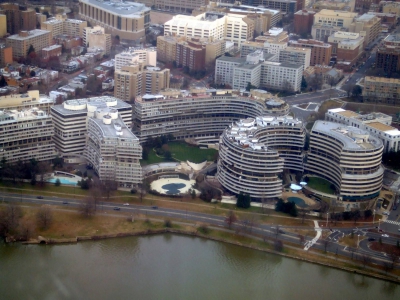John Newton Mitchell (September 15, 1913 November 9, 1988) was the 67th Attorney General of the United States under President Richard Nixon and chairman of Nixon's 1968 and 1972 presidential campaigns. Prior to that, he had been a municipal bond lawyer and one of Nixon's closest personal friends. He was tried and convicted as a result of his involvement in the Watergate scandal.
After his tenure as U.S. Attorney General, he served as chairman of Nixon's 1972 presidential campaign. Due to multiple crimes he committed in the Watergate affair, Mitchell was sentenced to prison in 1977 and served 19 months. As Attorney General, he was noted for personifying the "law-and-order" positions of the Nixon administration, amid several high-profile anti-war demonstrations.
The Watergate scandal was a major political scandal in the United States involving the administration of U.S. President Richard Nixon from 1972 to 1974 that led to Nixon's resignation. The scandal stemmed from the Nixon administration's continual attempts to cover up its involvement in the June 17, 1972, break-in of the Democratic National Committee headquarters at the Washington, D.C. Watergate Office Building. After the five perpetrators were arrested, the press and the U.S. Justice Department connected the cash found on them at the time to the Nixon re-election campaign committee. Further investigations, along with revelations during subsequent trials of the burglars, led the U.S. House of Representatives to grant its judiciary committee additional investigation authority to probe into "certain matters within its jurisdiction", and the U.S. Senate to create a special investigative committee. The resulting Senate Watergate hearings were broadcast "gavel-to-gavel" nationwide by PBS and aroused public interest. Witnesses testified that Nixon had approved plans to cover up administration involvement in the break-in, and that there was a voice-activated taping system in the Oval Office. Throughout the investigation, the administration resisted its probes, which led to a constitutional crisis.Several major revelations and egregious presidential action against the investigation later in 1973 prompted the House to commence an impeachment process against Nixon. The U.S. Supreme Court ruled that Nixon had to release the Oval Office tapes to government investigators. The tapes revealed that Nixon had conspired to cover up activities that took place after the break-in and later tried to use federal officials to deflect the investigation. The House Judiciary Committee approved three articles of impeachment against Nixon for obstruction of justice, abuse of power, and contempt of Congress. With his complicity in the cover-up made public and his political support completely eroded, Nixon resigned from office on August 9, 1974. It is believed that, if he had not done so, he would have been impeached by the House and removed from office by a trial in the Senate. He is the only U.S. president to have resigned from office. On September 8, 1974, Nixon's successor, Gerald Ford, pardoned him.
There were 69 people indicted and 48 people—many of them top Nixon administration officials—convicted. The metonym 'Watergate' came to encompass an array of clandestine and often illegal activities undertaken by members of the Nixon administration, including bugging the offices of political opponents and people of whom Nixon or his officials were suspicious; ordering investigations of activist groups and political figures; and using the Federal Bureau of Investigation, the Central Intelligence Agency, and the Internal Revenue Service as political weapons. The use of the suffix "-gate" after an identifying term has since become synonymous with public scandal, especially political scandal.

1975Feb, 21
Watergate scandal: Former United States Attorney General John N. Mitchell and former White House aides H. R. Haldeman and John Ehrlichman are sentenced to prison.
Choose Another Date
Events on 1975
- 26Jun
Pine Ridge Indian Reservation
Two FBI agents and a member of the American Indian Movement are killed in a shootout on the Pine Ridge Indian Reservation in South Dakota; Leonard Peltier is later convicted of the murders in a controversial trial. - 15Aug
Sheikh Mujibur Rahman
Bangladeshi leader Sheikh Mujibur Rahman is killed along with most members of his family during a military coup. - 15Aug
Yasukuni Shrine
Takeo Miki makes the first official pilgrimage to Yasukuni Shrine by an incumbent prime minister on the anniversary of the end of World War II. - 27Aug
Dili
The Governor of Portuguese Timor abandons its capital, Dili, and flees to Atauro Island, leaving control to a rebel group. - 1Oct
Ellice Islands
The Seychelles gain internal self-government. The Ellice Islands split from Gilbert Islands and take the name Tuvalu.

 English
English  español
español  français
français  português
português  русский
русский  العربية
العربية  简体中文
简体中文 